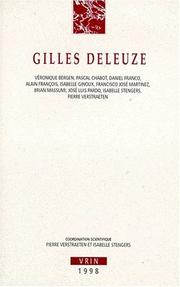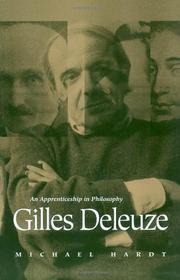| Listing 1 - 10 of 442 | << page >> |
Sort by
|

ISBN: 271161364X 9782711613649 Year: 1998 Volume: 1998 Publisher: Paris: Vrin,
Abstract | Keywords | Export | Availability | Bookmark
 Loading...
Loading...Choose an application
- Reference Manager
- EndNote
- RefWorks (Direct export to RefWorks)
À relire l'œuvre de Deleuze après sa mort, par une illusion rétrospective presque naturelle, ses textes se révèlent émaillés d'anticipations prophétiques de ce destin tragique. Lignes sombres faufilant régulièrement ses pages et leurs problèmes, les occurrences de la mort se réactivent sans cesse. La mort, ce mot, le plus concret, toujours abstraitement agencé dans l'économie d'un enchaînement ou d'un argument, toujours neutralisé par l'usage que la vie en opère. Ces occurrences nous rappellent par ce choix impossible et pourtant à l'évidence nécessaire, que le grand choix de la pensée de Deleuze (et donc pour tous), est choix délibéré (donc éclairé) de lutter contre le chaos : pensée à ce titre toujours contrainte et forcée, " misosophie " bien plus que " philosophie ", création violente de vie et non montée diaphane à un quelconque ciel des idées. Faut-il à cet égard rappeler, contre les étonnements ou interrogations de certains, que le choix de mort lorsqu'il se prend, loin d'être le triomphe de la mort sur la vie constitue la poursuite de la même vie de la pensée par d'autres moyens... Non pas Œdipe à Colone tirant le bilan négatif de sa vie, mais bien la vie toujours affirmative ne cessant de nous éclairer comme à l'accoutumée sur les ressources de résistance face à l'inacceptable.
Book
ISBN: 0826421121 0826426964 9780826421128 9780826426963 Year: 2009 Publisher: London Continuum
Abstract | Keywords | Export | Availability | Bookmark
 Loading...
Loading...Choose an application
- Reference Manager
- EndNote
- RefWorks (Direct export to RefWorks)
Book
ISBN: 284174129X Year: 1998 Volume: *18 Publisher: Paris Kimé
Abstract | Keywords | Export | Availability | Bookmark
 Loading...
Loading...Choose an application
- Reference Manager
- EndNote
- RefWorks (Direct export to RefWorks)

ISBN: 0231138156 0231138148 Year: 2005 Publisher: New York (N.Y.) : Cambridge university press,
Abstract | Keywords | Export | Availability | Bookmark
 Loading...
Loading...Choose an application
- Reference Manager
- EndNote
- RefWorks (Direct export to RefWorks)
Book
ISBN: 9781501325038 9781623563493 9781623560683 9781623565305 1623560683 1623565308 9781628927085 1628927089 1501325035 1623563496 Year: 2014 Publisher: London Bloomsbury Book Auctions
Abstract | Keywords | Export | Availability | Bookmark
 Loading...
Loading...Choose an application
- Reference Manager
- EndNote
- RefWorks (Direct export to RefWorks)
Book
ISBN: 9781474447294 9781474447287 9781474447300 9781474447317 Year: 2019 Publisher: Edinburgh Edinburgh University Press
Abstract | Keywords | Export | Availability | Bookmark
 Loading...
Loading...Choose an application
- Reference Manager
- EndNote
- RefWorks (Direct export to RefWorks)

ISBN: 0816621608 Year: 1993 Publisher: Minneapolis (Minn.): University of Minnesota
Abstract | Keywords | Export | Availability | Bookmark
 Loading...
Loading...Choose an application
- Reference Manager
- EndNote
- RefWorks (Direct export to RefWorks)
Book
ISBN: 3034308779 9783034308779 Year: 2013 Publisher: Oxford Peter Lang
Abstract | Keywords | Export | Availability | Bookmark
 Loading...
Loading...Choose an application
- Reference Manager
- EndNote
- RefWorks (Direct export to RefWorks)
Book
ISBN: 9781441152404 Year: 2010 Publisher: London Continuum
Abstract | Keywords | Export | Availability | Bookmark
 Loading...
Loading...Choose an application
- Reference Manager
- EndNote
- RefWorks (Direct export to RefWorks)
Book
ISBN: 1538143690 9781538143698 9781538143681 Year: 2020 Publisher: Lanham Rowman & Littlefield
Abstract | Keywords | Export | Availability | Bookmark
 Loading...
Loading...Choose an application
- Reference Manager
- EndNote
- RefWorks (Direct export to RefWorks)
Literature holds a privileged place in Deleuze’s works. Not only is it the art that most clearly reveals his aesthetics, but it also serves as the laboratory of his thought, the space where he experiments with concepts that become part of his ongoing philosophical project. In this brilliant analyses of Deleuze’s texts on Proust, Sacher-Masoch, Kafka, Carmelo Bene, Melville and Beckett, Pombo Nabais traces the development of Deleuze’s aesthetics across three distinct periods of his thought: the transcendental empiricism of Difference and Repetition and The Logic of Sense; the philosophy of Nature of Anti-Oedipus and A Thousand Plateaus; and the philosophy of Spirit of The Fold, What Is Philosophy? and Essays Critical and Clinical. More than a simple account of Deleuze’s literary theory and aesthetics, this book offers a provocative and original reading of Deleuze’s entire philosophy, highlighting the question of modality (the actual, the virtual, the possible, the impossible and the incompossible), the problematic relationship between the event and the assemblage, and the unifying theme of the vitalism of nonorganic life.
| Listing 1 - 10 of 442 | << page >> |
Sort by
|

 Search
Search Feedback
Feedback About UniCat
About UniCat  Help
Help News
News